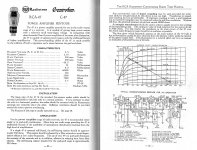I am contemplating the restoration of a Lafayette Superheterodyne Radio - 1935.
But that's not what this post is about. This radio uses 2 x 47 pentodes in PP on the output. I may sound like such a geek saying this but they really are beautiful valves, so I got to thinking about building an amp with them. I have discovered that they are available here and there (even in South Africa). Does anyone have any experience with these valves? How do they perform sound quality-wise by comparison with more "modern" valves like the EL84 or EL34? Please let me know your thoughts.
(I searched but didn't find much about 47s on this forum)
Datasheet
But that's not what this post is about. This radio uses 2 x 47 pentodes in PP on the output. I may sound like such a geek saying this but they really are beautiful valves, so I got to thinking about building an amp with them. I have discovered that they are available here and there (even in South Africa). Does anyone have any experience with these valves? How do they perform sound quality-wise by comparison with more "modern" valves like the EL84 or EL34? Please let me know your thoughts.
(I searched but didn't find much about 47s on this forum)
Datasheet
An externally hosted image should be here but it was not working when we last tested it.
Last edited:
Go to Bartola Valves and look at the 300b amp with 47 in triode as driver. That's a great way to use them - you should get wonderful sound. That's certainly what I would do. I use a 46 as driver for my 300b and very pleased with it. Ale Moglia likes the 47.
Other than having a filamentary cathode the 47 is very similar to the 6F6, 2A5 & 42. Perhaps it is the origin of the family. So you might find circuits for those that would be OK within the limits of the 47. This version of the data sheet shews a typical receiver using PP 47s.🙂
Attachments
I got interested in PP 47 years ago after reading about Gary Pimm's experiments with it. Never did build one but still have some around.
Gary's website is long gone but, thanks to the Wayback Machine . . .
Gary Pimm's DIY audio pages
Gary's website is long gone but, thanks to the Wayback Machine . . .
Gary Pimm's DIY audio pages
